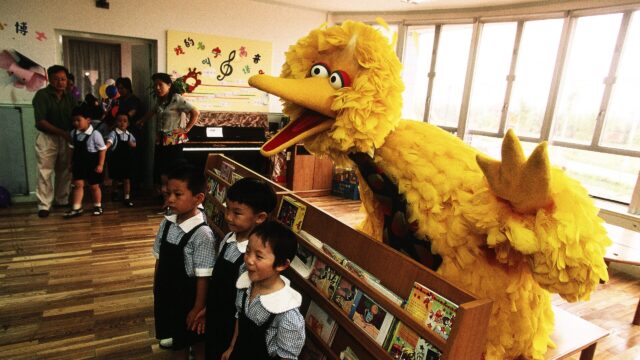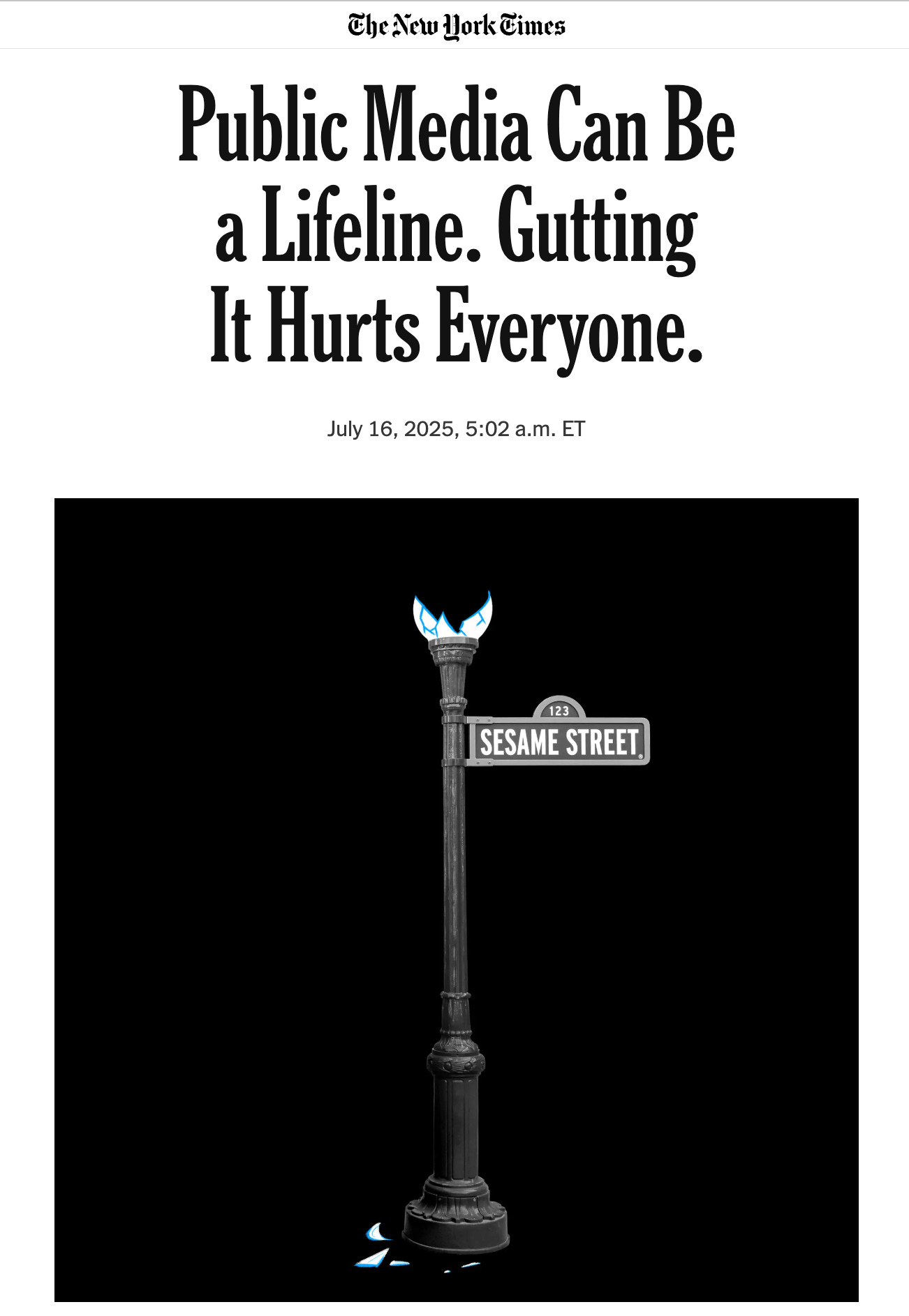The Bell Finally Tolls for National Propaganda Radio

Greg Collard and I were joking before the last America This Week that the show needed an onscreen “Big Bird Counter,” to highlight the inevitably enormous number of Sesame Street references in media this week, while the fate of NPR and PBS is debated.
From the New York Times op-ed page today:

For most of its history, PBS and the Corporation for Public Broadcasting have been a combined net plus for American citizens. They produced pioneering programs ranging from NOVA to This Old House to Frontline, and introduced Americans to cool foreign programs like Doctor Who, Monty Python’s Flying Circus, and I, Claudius. The quintessential PBS show was informative and quirky without pulling ideological threads, even if its Masterpiece roster sometimes over-scratched the upscale viewer’s costume-drama itch. From nature shows to comedy to documentaries, PBS was a sound counterweight to the boobs-and-car-chase lineups on commercial TV, providing the most remote communities with quality programming.
It should have run forever. National Public Radio ruined the enterprise, turning the country’s signature public news shows into an endless partisan therapy session, a Nine Perfect Strangers retreat for high-income audiences micro-dosing on Marx and Kendi. Forget conservatives, NPR’s trademark half-whispered stylings linking diets to rape culture or denouncing white teeth as a hangover of colonialism began in recent years to feel like physical punishment to the most apolitical listeners, like having a blind librarian hacksaw your forehead. Even today’s New York Times piece couldn’t argue the bias issue, instead offering a mathematical deflection:
Republicans complain, not always wrongly, that public media reflects left-leaning assumptions and biases. And they can fairly tell NPR and PBS to do a better job of reflecting the citizenry that is subsidizing them. Yet the “national” part of NPR (or National Public Radio, as it used to call itself) that chafes conservatives may well be just fine without federal funds. Only about 2 percent of its budget comes directly from the federal government, and it may have an easier time raising money from its many dedicated listeners if Congress punishes it.
Is this an argument for or against public funding of NPR? If listeners can make up the shortfall, why don’t we just do that and be done with the controversy? One reason is that the Times is doing what most outlets do in covering this story, skipping the inconvenient detail that NPR derives a significant chunk of its revenue from member stations using public funds to purchase its programs. That’s still a federal subsidy, only less direct, and not as easily made up by “dedicated listeners.”
More interesting is that while NPR and its supporters mostly recognize the station has a bias issue, they’ve abandoned the idea that this needs fixing. Earlier this year, CEO Katherine Maher tiptoed in the direction of concessions, saying she regretted calling Trump the rare fascist-racist-sociopath trifecta (“a fascist and deranged racist sociopath”) and addressing whistleblower Uri Berliner’s concerns by noting NPR could have covered the Hunter Biden laptop story “more aggressively or sooner.” However, when NPR sued to counter a Trump executive order canceling funding, Maher took a different tone. In a defiant statement, she pointed out that Trump’s Order, “Ending Taxpayer Subsidization of Biased Media,” likely violated the First Amendment on viewpoint discrimination grounds by promising to “cease indirect funding.” In other words, even if NPR is biased, the White House can’t tell member stations not to buy it.
Which is true! However, Maher missed that in making a winning legal argument, she conceded the core political complaint of bias, likely sealing its fate in congress. There’s something indescribably odd in the station’s new orientation. Donald Trump’s issue with NPR, which he calls “worse than CNN & MSNDC put together,” is obvious and tied to the station’s humorously relentless anti-Trump editorial line (“ICE Goes After Renters, a Big Beautiful Jolt To Your Electric Bill” is typical fare). Many journalists however would say the point of the CPB setup was to create public media that would be legally empowered to criticize a sitting administration. I agree. If NPR editors really believe in their reporting, they should be free to run it without fear of losing funding. Unfortunately, that’s not really what’s at issue.
The new iteration of NPR doesn’t see a problem with taking funds from a huge plurality or even a majority of citizens and pursuing a nakedly politicized, ear-splitting propaganda project in opposition to the views of those people. NPR is the vegetables we refuse to eat, administered up a different entrance for our own good. Maher cast the mission as informational hygiene: “NPR’s programming and services are core to the overall health of American public radio.” NPR has been transformed into domestic Voice of America, a bullhorn of Rightthink beamed into the homes of all those Christians, MAGAts, political agnostics, and other captives of unenlightened America who’ve been deceived into supporting the national project. NPR’s programming sounds exactly like the Radio Free Europe broadcasts I used to hear streaming into Leningrad, only the target is American rather than Soviet patriotism. The station’s take on the “nation” it covers is almost like the Zucker Brothers spoof where an East German mentions having an uncle who lived in the U.S., but “he managed to escape in a balloon during the Jimmy Carter presidency.” That’s NPR’s view of America all the time.
Just this past weekend, on Bastille Day, NPR re-ran the hilariously titled segment, “The price you pay for being smart,” which featured a Yale professor explaining why the humanities are so important. “The humanities allow you to talk about anything. And that’s a threat… Particularly, you can challenge the nation’s greatness.” Challenging my nation’s greatness isn’t the first thing that comes to mind when I hear the word humanities, but it apparently is for NPR. The agony of the station’s producers is never more obvious than on the Fourth of July, which is basically covered in two ways.
Lane one: the pre-American roots of barbecue! “Barbecue as we know it has the same origins — stretching back to before Europeans set foot in the U.S.,” offered one of this year’s entries, adding: “An early encounter between Spanish conquerors and Indigenous Caribbeans that brought us the actual word barbecue…” Lane two: “Frederick Douglass’ descendants read ‘What to the Slave Is the Fourth of July?’” Definitely thought-provoking the first time you hear it, but the story is run every year, often in tandem with “I’ve never heard a black family hail July 4th as Independence Day”-type features, which again would be interesting if other themes were explored even occasionally.
A search for the word “patriotism” on the site is always amusing, turning up stories like “Black Patriotism: When Love Of Country Means Holding It Accountable,” or “As America Turns A Year Older, Poll Finds Patriotism Has Slipped A Bit,” or my personal favorite, “Greatness Is Not A Given: ‘America The Beautiful’ Asks How We Can Do Better.” The latter was a think piece about Katherine Lee Bates, author of the “America the Beautiful” poem, which she wrote at a moment of inspiration at the top of Pikes Peak. NPR, however, apparently wanted to make sure audiences knew America The Beautiful isn’t all happiness and sunshine, not triumphant claptrap about a still-waving flag like the national anthem. “Rather, this young feminist poet, who had just emerged from a deep depression,” the story reads, “is asking if the nation… can ever live up to its high ideals.” Maybe, with time and enough bummerific features like this, we can get 7th inning crowds everywhere singing America, Do Better…
NPR was never a Lee Greenwood or Wayne Newton concert, but its tradition for decades was to gently flex a patriotic muscle every now and then, as if humbly celebrating its own small contribution to the American experience. For instance, it used to have an annual reading of the Declaration of Independence, but ditched it in a two-stage splashdown after the Summer of Floyd. In 2021, staff read it after an introductory segment about the Declaration’s “flaws and deeply ingrained hypocrisies.” The following year, the segment was replaced with “two Pulitzer Prize-winning historians” holding a discussion: “On this July 4th, what does equality mean?” After that, zilch. The old Declaration readings are still online, but now feature a trigger warning at the top about Jefferson’s “merciless Indian savages” line: “This story quotes the U.S. Declaration of Independence — a document that contains offensive language about Native Americans, including a racial slur.”

If you’ve reached the stage of calling the Declaration of Independence “a document that contains offensive language,” you probably shouldn’t be working as a guardian of “national” public radio. If a private outlet feels the need to go there, mazel tov, but the federal government shouldn’t be issuing Surgeon General’s warnings for its foundational ideas. If it is doing that, it’s probably appropriate to wonder what’s behind that messaging imperative.
I’m not a particularly patriotic person — I doubt there’s a flag in my house — but I don’t think taxpayers should be funding an endless hit piece on the national experiment, either, especially one that sounds like a word-for-word replay of old Soviet campaigns (“Five Shames on the Conscience of America!”). Where is this coming from? Why are so many people in positions of influence in a superpower suddenly so keen on letting the air out of the national tires? Whatever it is, NPR is its most visible symbol, and needs to take a rest for a while, at least until the government settles on a formula for producing media without didactic political instruction. Good night, Big Bird. It was fun while it lasted.
https://www.racket.news/p/the-bell-finally-tolls-for-national
